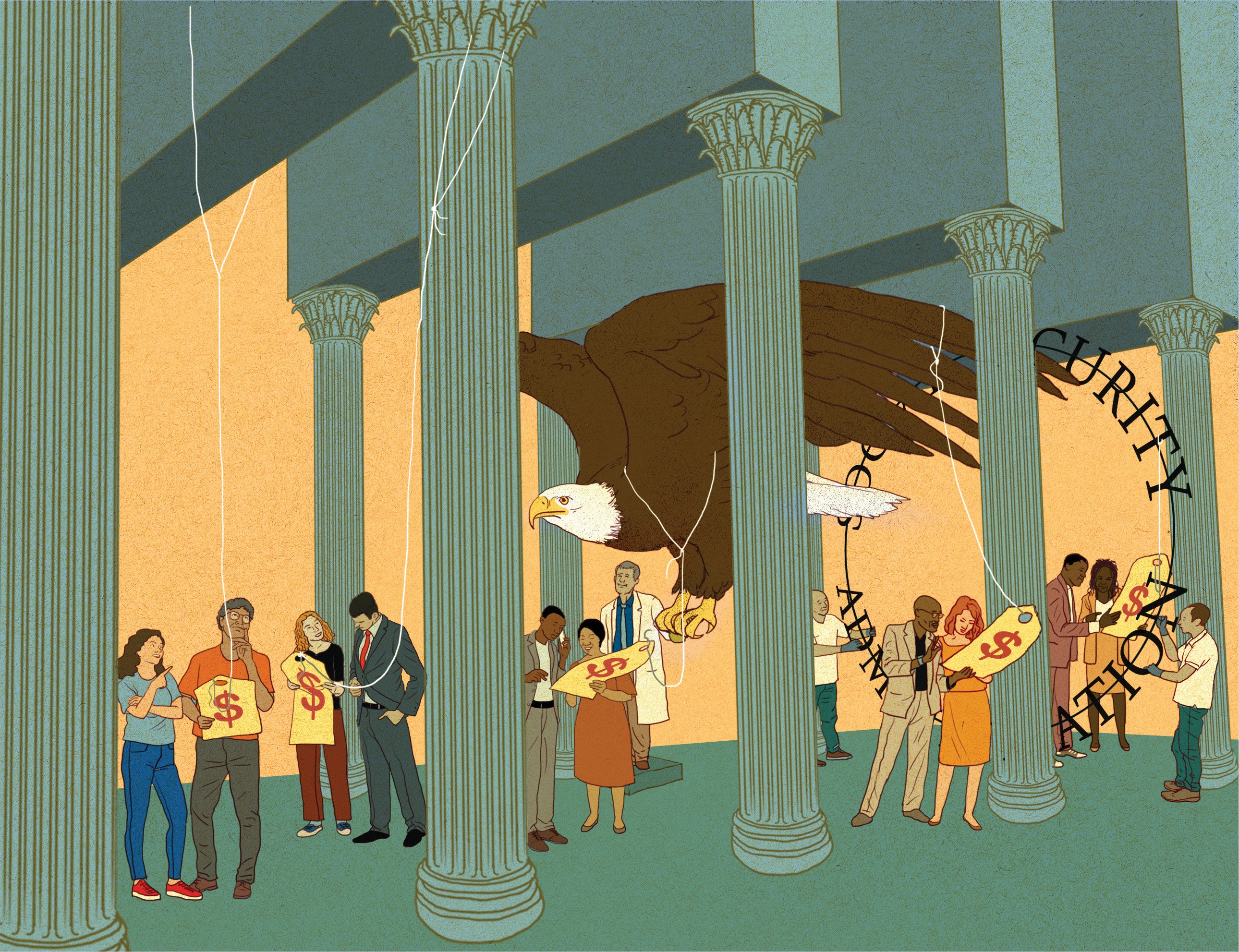Today’s items.
- How conspiracy theorists are attacking meteorologists;
- Naomi Oreskes on how the right attacks Social Security because it’s a “big government” program that actually works;
- The connection between American Christians and Uganda’s “kill the gays” policy
- And today’s music: The National: I Should Live in Salt
*

CNN, 27 May 2023: ‘Murderers’ and ‘criminals’: Meteorologists face unprecedented harassment from conspiracy theorists
“Murderers.” “Criminals.” “We are watching you.”
These are just a handful of the threats and abuse sent to meteorologists at AEMET, Spain’s national weather agency, in recent months. They come via social media, its website, letters, phone calls – even in the form of graffiti sprayed across one of its buildings.
Abuse and harassment “have always happened” against the agency’s scientists, Estrella Gutiérrez-Marco, spokesperson for AEMET, told CNN.
But there has been a rapid rise recently, coinciding with extreme weather in Spain. A severe drought has shrunk water levels to alarming lows, exacerbated by record-breaking April temperatures.
The article considers Spain first, but of course this kind of thing is going on everywhere.
National weather services, meteorologists and climate communicators in countries from the US to Australia say they’re experiencing an increase in threats and abuse, often around accusations they are overstating, lying about or even controlling the weather.
That “chemtrails” conspiracy theory is still a thing. (Several years ago I chatted briefly with the woman gardener who serviced my next door neighbor — the neighbor I’ve only spoken to once, briefly, in eight years — and this gardener wanted to be sure I understood the seriousness of the chemtrails that those jets in the sky that we could see above us. I listened politely for a minute or so, and she concluded by saying “Thank you for listening.”)
Examples also from France, Australia, the UK, and of course the US.
US meteorologists and climate communicators have not escaped the barrage of abuse and conspiracies.
“Whenever I posted about global topics, like the yearly temperature report, the comments section would be filled with political jabs and conspiracy theories,” said Elisa Raffa, a broadcast meteorologist with Queen City News, based in Charlotte, North Carolina.
And goes on to discuss conspiracy theory trends, especially beginning with Covid.
These kinds of conspiracies are usually grounded in the idea that a set of institutions is “using the pretext of climate change, or the pretext of solving public policy issues, to enact some insidious agenda,” she told CNN.
And the weather is an easy way in. Many aspects of climate science can feel very technical or abstract, but the weather is something people interact with frequently, said King.
“It’s a much more immediate way to bring a wider audience into that skepticism … planting seeds of doubt against the climate agenda writ large,” she said.
And
Conspiracy theories feed on this fear by offering a simple, enticing explanation, said López-Borrull. It’s easier to believe climate change is fake, or a manipulation by powerful people, than get your head around the complex problem and what it means for society.
“Change is hard and scary,” Francis said.
And it’s easier to think a problem is faked that to honestly try to solve it.
\\
I referred to this item earlier but couldn’t find the link. I found it. This piece is analogous to the one above in that people of a certain conspiratorial mindset aim their thinking at everything they can. (My take as always is that these are by nature very frightened, paranoid people.)

Scientific American, Naomi Oreskes, 1 May 2023: False ‘Facts’ about Science and Social Security Share Origins, subtitled “Fake claims that Social Security is broken and that climate action isn’t urgent all come from flawed free-market ideology”
Oreskes is the co-author of The Big Myth: How American Business Taught Us to Loathe Government and Love the Free Market and author of Why Trust Science?. This piece begins:
Whether they work on climate change, evolution, vaccine safety, or any of a host of other issues, scientists frequently face resistance from people offering “alternative facts.” How did we come to live in a world where so many people feel vaguely supported opinions are just as valid as evidence-based scientific research—where people can’t tell the difference between opinion and fact?
Then her thesis:
Republicans in Congress have recently threatened drastic cuts to Social Security and even privatization. Their ostensible reason is the need to balance the federal budget. “The numbers can’t work” without big cuts to Social Security, former Republican finance committee aide Chris Campbell has declared. In fact, Social Security isn’t a drain on the federal budget; it pays for itself through a dedicated payroll tax.
Why do conservatives keep attacking a successful program that pays for itself? Because of its success. Social Security is “big government” that works. Its accomplishments refute the conservative refrain that federal programs are costly failures and that the government should just leave things to the free market.
In fact,
Most federal programs that conservatives love to hate were implemented in response to the failures of free markets. In the late 19th century anticompetitive business practices strangled markets and replaced them with monopolies. In the early 20th century one in every 1,000 U.S. workers was killed on the job. In the 1930s millions of able-bodied Americans were thrown out of work and onto breadlines through no fault of their own.
It wasn’t the private sector that fixed these problems. It was government, particularly the federal government. The Sherman Antitrust Act of 1890 was passed to protect competition. Workers’ compensation laws ensured that people injured on the job would receive redress. Laws were passed to limit child labor, expand access to education and—during the Great Depression—rescue American capitalism from a state of near collapse. Unsupported “alternative facts” frequently surfaced in debates over these programs. They appeared in later arguments over Social Security, too.
And concluding,
…reasoned discussion is blocked by ideology that ignores evidence. This is the same fruitless dynamic that stalls action on the climate crisis. Senator Daniel Patrick Moynihan of New York popularized the adage that “everyone is entitled to his own opinion, but not his own facts.” Moynihan could have been talking about science, but he said this during a debate over Social Security.
(Of course, I’ve previously mentioned the interstate highway system, and NASA, as big government programs that actually worked.)
\\
And the connection between American Christians and Uganda’s “kill the gays” policy.

NY Times, Maddie Bender via Nicholas Kristof, 27 May 2023: When Your Sexuality Is Against the Law
The NYT columnist presents the winner of his annual journey to take a university student to highlight an issue that needs attention. This year it’s Maddie Bender (who mentions that she is bisexual), recent Yale graduate, writing from Sierra Leone.
Sierra Leone is one of more than 30 African nations (over half the continent) that criminalize same-sex relations. While most of the gay people I spoke with there did not seem to fear being arrested, they said discrimination against them was widespread in housing, employment and family life.
Meanwhile, American Christian groups with records of fighting L.G.B.T.Q. rights have poured millions of dollars into African countries, according to a 2020 report. Some American evangelicals have been known to encourage anti-L.G.B.T.Q. legislation in countries such as Uganda.
Still, Africa is huge — look at a globe, or some of those map comparison pages (that I’ve linked), to see that the US and China and more could fit inside Africa — and the writer finds support groups in São Tomé and Príncipe, an island nation off the west coast of Africa, and makes this key point:
Spending time online may be broadening some people’s worldviews. A 2020 review of Africans’ attitudes toward homosexuality suggests that frequent internet users are more likely to be tolerant of gay people.
Two teenagers in the city of Makeni in northern Sierra Leone, Fatmata Binta Jalloh, 17, and Marie Kamara, 16, told me that while they believe homosexuality doesn’t exist in their country, they’ve seen plenty of gay people online. They recalled watching a viral TikTok video of a lesbian couple celebrating after conceiving a child through in vitro fertilization. The video, they said, made them happy for this couple, whose sexuality they had been taught to fear.
The internet might appeal to your biases and corrode your ability to reason, but it can also make you free. To realize what’s out there in the world, that your parents or your homeschooling or your culture might have tried to hide from you.
And
We should be outraged at how far the Christian right has gone to support the persecution of gay people in African countries. These laws need to change, but I doubt that equal and opposite meddling is the solution.
\\\
This afternoon’s music:





